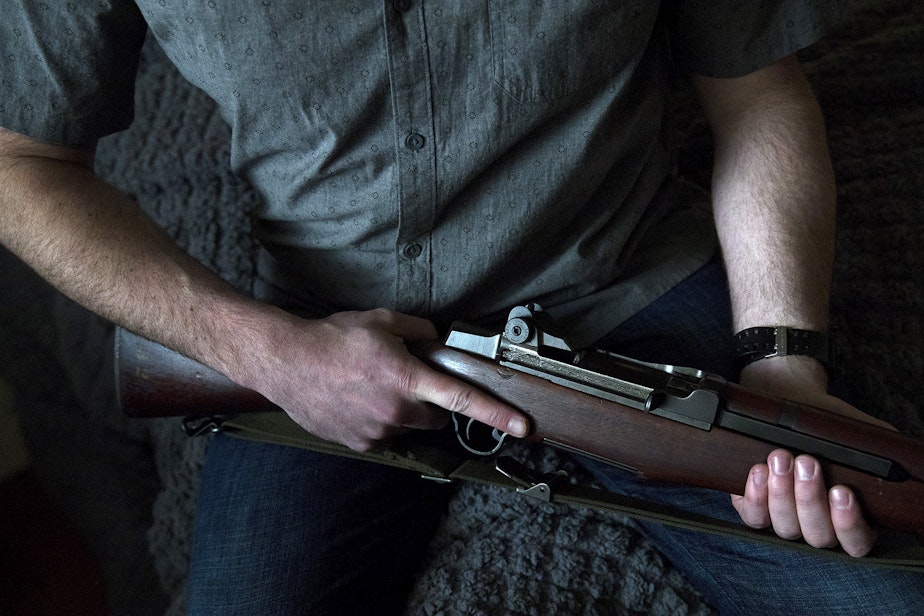Changes in law enforcement may be leading to fewer guns at home

The city and county of Spokane have seen an unprecedented number of gun removals so far this year.
And while there are different reasons a person can have firearms removed from their home, some of this increase appears to be driven by a change in how courts are treating domestic violence protection orders.
Warning: This story involves discussion of domestic violence and suicide.
There's no central registry of firearm ownership in America.
That can make confiscating guns owned by accused domestic abusers difficult. But Inlander staff reporter Nate Sanford said changes to how Spokane police are investigating domestic violence cases is leading to a rising number of gun confiscations.
"In the first half of this year, police in Spokane, and that's both the city of Spokane and then Spokane County as well, have taken in 1,015 guns," Sanford said.
That's a big increase. According to Sanford, it's 48% higher than the same time period last year, and a 35% increase over 2020, which was an all-time high.
Sponsored
About half of those guns were taken from Domestic Violence Protection Order related situations, Sanford said. In 2014, Washington passed a law requiring people served with these orders to hand over any firearms to police. But for a long time, that law wasn't enforced.
A person could just say they don't have the guns anymore – that they've been given away or sold. Since there's no gun registry tracking firearms after they've been purchased at a licensed retailer, there was no way to follow up on if the person had actually disposed of their guns.
But in 2020 Spokane used federal funding to hire a full-time firearms investigative analyst.
"Their entire job is to track down these orders and make sure they're being followed up on," Sanford said. "Because there's no registry that involves a lot of detective work and sort of digging around, they look through not just gun store records, but also pawnshop records and hunting licenses."
But domestic violence-related surrender orders are just one reason a firearm may be removed from someone's home. The vast majority of Extreme Risk Protection Orders involve a risk of self-harm.
Sponsored
The vast majority of gun deaths in Washington state are suicides.
Brett Bass is the manager of Safer Homes at Forefront Suicide Prevention at the University of Washington. He said that preventing suicide by gun death comes down to how we think about firearm safety.
Bass is also a Marine Corps veteran, and holds Range Safety Officer, Chief Range Safety Officer, pistol instructor, and rifle instructor certifications from the National Rifle Association.
He said that while guns can be forcibly removed from the home using Extreme Risk Protection Orders, when possible, it's better for people to voluntarily have gun removed from their homes.
"It is just better if people voluntarily seek help," Bass said. "The whole deck is stacked in your favor if you're proactively engaged in help-seeking behaviors."
Sponsored
Washington state has what's called a Temporary Emergency Transfer Law, which allows people, when not in the state of mind to be near a firearm, to have them temporarily placed with someone else. It can last as long as necessary, and the only requirements are that both parties have to be legally able to own a firearm, and the person holding onto it doesn't use it for anything.
Bass does come up against push back from people who fear that laws such as the Temporary Emergency Transfer Law will result in their guns being taken away permanently.
"There's a lot of trust building that has to go into this in which everyone's operating in good faith," Bass said. "Saying like, 'No, I'm not talking about removing anybody's Second Amendment rights. I'm saying that right now, under this set of circumstances, it's just probably not safe to be around this thing.'"
When Bass said when he trains people on firearm usage, he focuses a lot on risk management. That's both keeping your gun from injuring another person, but also keeping it from harming you. Thinking proactively about where a firearm will go or who can take it if a person ends up in a mental health crisis is a form of risk management.
"An ounce of prevention is worth more than the pound of cure, as they say," Bass said. "Just making plans ahead of time is really important because just like in a self defense situation, you're not going to figure out what to do during the emergency. It's important to have a plan in place ahead of time."
Sponsored
If you or a loved one is dealing with a mental health crisis: call the suicide and crisis lifeline. That number is 988. You can also text 741 741.





